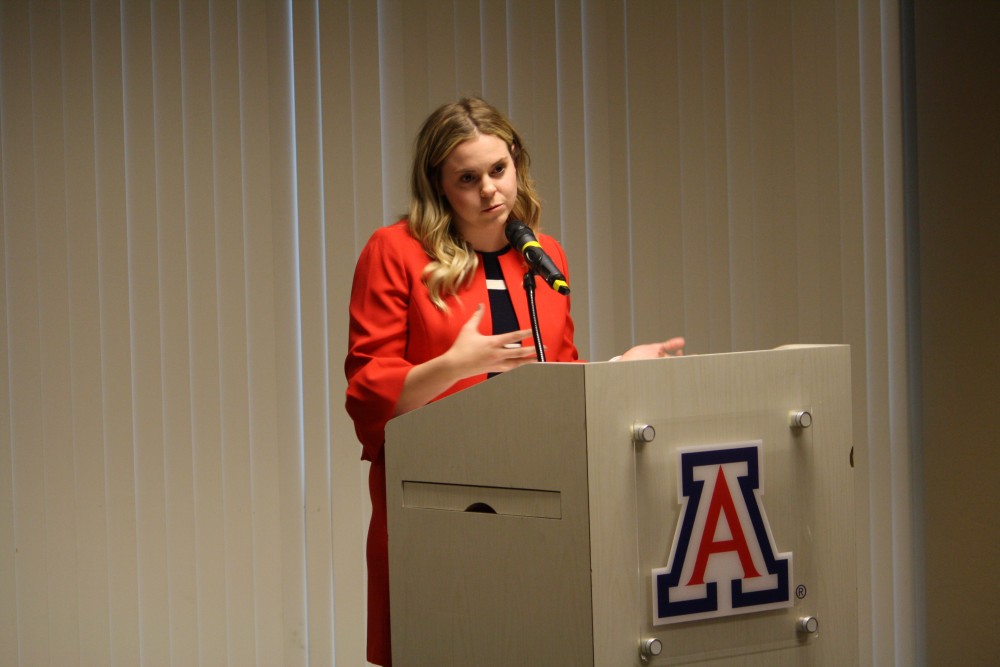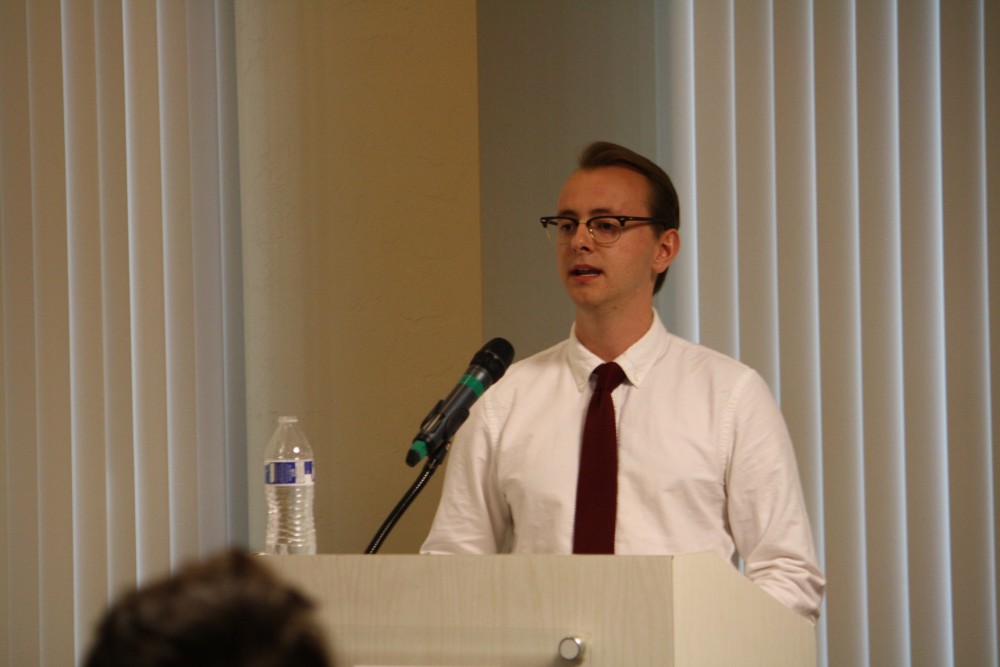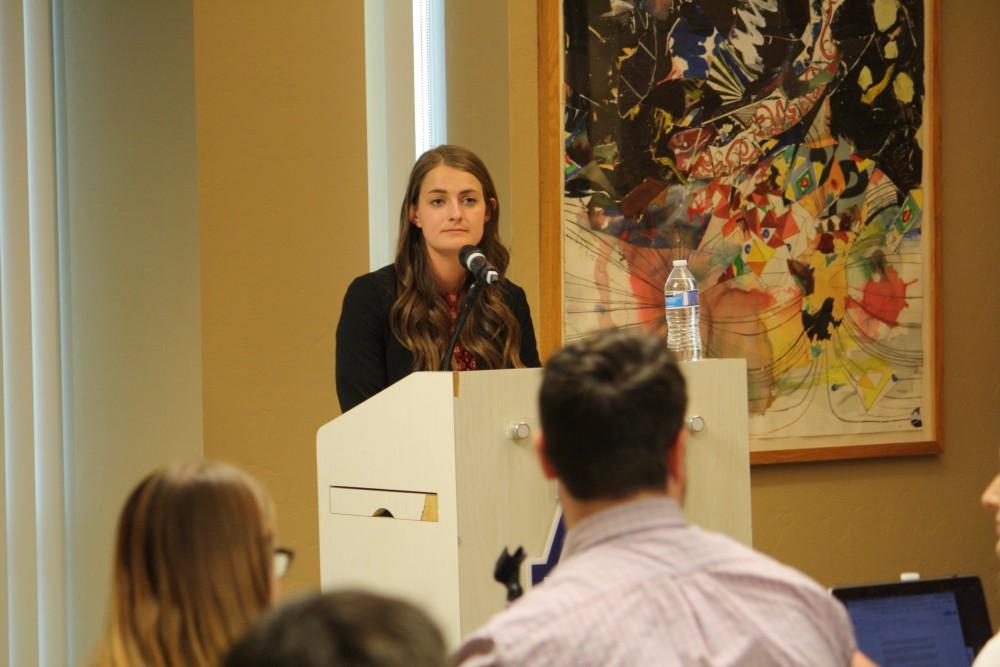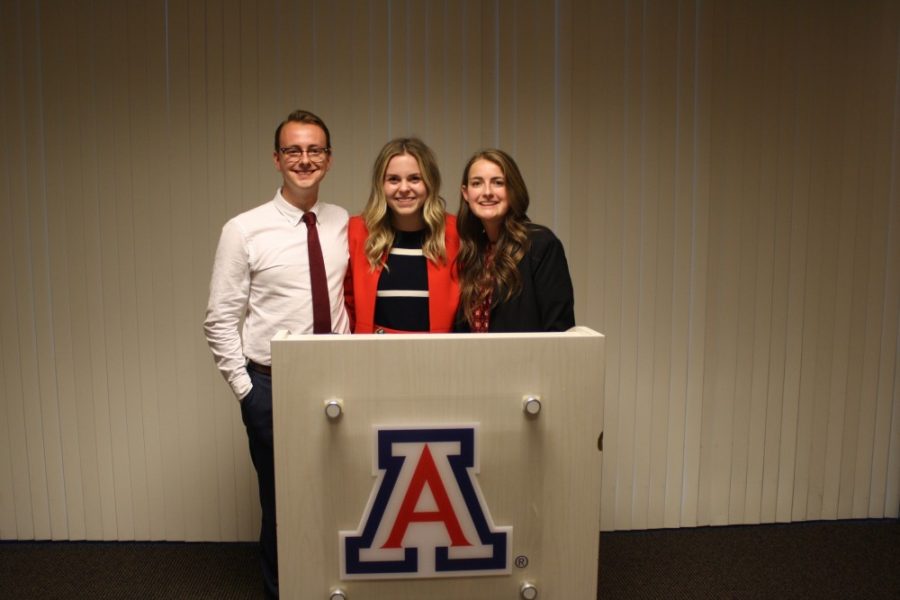The Associated Students of the University of Arizona, UA’s student body government, held a Q&A for the executive office candidates on Thursday, March 21, in the Sabino Room of the Student Union Memorial Center. The Q&A was focused on student body engagement and how to increase diversity within ASUA.
Sydney Hess is running for student body president, Bennett Adamson is running for executive vice president and Kate Rosenstengel is running for administrative vice president. All three candidates are running unopposed.

Sydney Hess: Student body president candidate
Hess previously served as president of Freshman Class Council and a student body senator. She is currently the chief of staff for Rosenstengel.
The role of the president is to focus on policy and elections, in addition to being a student advocate. Hess’ three platforms are student advocacy, community and civic engagement and mental health awareness.
RELATED: ASUA Senate Q&A provides students with chance to learn about candidates
“What I propose that we do is hold two public town halls per semester and potentially have those in cultural centers, if those cultural centers feel comfortable,” she said. “I think that’s a great way to meet with students and engage with students in a way we haven’t done before.”

Bennett Adamson: Executive vice president candidate
Adamson is currently the senator for the College of Social and Behavioral Sciences. He also serves on the Undergraduate Council and the Student Services Fee Advisory Board.
The EVP oversees senate meetings and the appropriations board and registers clubs. Adamson’s goals as EVP are to increase efficiency, visibility and purpose.
“I feel like sometimes senators get lost with what they should be doing or how they should be affecting change in their colleges or campus wide,” Adamson said. “I really want to see the EVP take a more tangible role in guiding the senate.”

Kate Rosenstengel: Administrative vice president candidate
Rosenstengel is the current AVP for ASUA. She was previously a member of Freshman Class Council and the Student Body Senate.
The AVP works with the 12 programs and services in ASUA.
“It’s been an incredible experience, because programs and services are the part of ASUA that reach the most people,” she said.
Rosenstengel’s main goal is to continue what she’s started this year as AVP, including bringing more awareness to programs and services offered by ASUA and advocating for “I Will” week.
Q&A
Marlon Freeman, ASUA’s election commissioner, asked the candidates to comment on the DACA protest that happened in response to Border Patrol’s presence on campus Wednesday, March 20.
Hess said it was disheartening students don’t feel comfortable on campus.
“Students aren’t being heard,” Hess said. “This is not a something new. It’s been in the list of demands from the marginalized students from the University of Arizona … this document has been around for a while.”
She stressed every student should feel safe on campus.
RELATED: Leaders of tomorrow: get to know the ASUA executive candidates
Adamson agreed with Hess and added it is disheartening students feel their voices aren’t being heard by ASUA.
“Maybe it was just an honest mistake, but that’s a problem in of itself, that it wasn’t on their minds,” Adamson said.
All three candidates mentioned ASUA released a statement regarding the protest Thursday, March 21, but Rosenstengel said ASUA needs to focus on putting out more statements in the future.
“I think next year, any time an issue happens on campus, it should be our first reaction,” she said. “But not just issue a statement but back it up when we are in meetings with administration.”
Natalynn Masters, the current student body president of ASUA, and Jillian Gallo, the executive chief of staff, asked the candidates how they are going to utilize the list of demands created in 2016 while in office.
Hess said ASUA can sit at the table and make sure every demand on the list is heard by administrators.
“Finding those little things that ASUA can do internally but then also taking that document … and ensuring that document and the history and the intention are at the forefront of the administration,” she said.
Rosenstengel said they should know the list of demands inside and out.
“Whatever issues that are brought up that are relevant to the document, we already have that information of what that should look like,” Rosentengel said.
Adamson agreed with Hess and Rosenstengel, emphasizing the importance of keeping the list of demands at the forefront.
“We talk about wanting to advocate for students and hear their voices. Well, there’s a document that was produced that was pretty specific,” Adamson said.
Freeman asked the candidates to address the lack of diversity in the executive positions and explain why students should vote.
“It is very disheartening that all three positions are going unopposed,” Rosenstengel said. “I sincerely hope this doesn’t happen again for ASUA … as discussed extensively in the town hall, we don’t know what every student at the UA goes through, but we know that … myself and Sydney and Bennett are all committed to learning how we can best represent the students, because we are here and we are willing to do what we can to help our students.”
RELATED: Students express concern over lack of diversity in ASUA election at cultural forum
Adamson said he intends to get started the day he is elected.
“I think the reasons you should vote is because it’s still important to have your voice heard, to engage, to make sure that it’s your student government and we’re here as servants of the student body,” he said.
Hess said the campaign season gave her the unique opportunity to learn from students.
“Knowing that I am going to potentially take this position on next year, constantly thinking about how us as executive candidates and the rest of ASUA can actually take those concerns and use them for the betterment of the university,” Hess said.
ASUA general elections are Monday, March 25, and Tuesday, March 26. Students can vote online at the ASUA election website.
Follow Priya Jandu on Twitter









